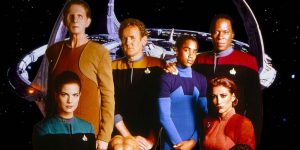Spider-Man: Far From Home Makes Black Widow’s Endgame Death Worse

Spider-Man: Far From Home made Black Widow’s death even worse. Introduced in 2010’s Iron Man 2 portrayed by Scarlett Johansson, Black Widow has never been properly developed as a character by the MCU, despite the fact she became one of the OG Avengers. Black Widow’s story came to a surprising close in Avengers: Endgame, when she sacrificed herself in order to acquire the Soul Stone.
That proved to be something of a controversial choice on Marvel’s part, with the studio seeming to have underestimated the extent to which audiences had connected with Natasha Romanoff, and as a result they’ve faced a lot of criticism for the way they handled her death. The most surprising decision was to give Tony Stark a funeral but not Black Widow. “That’s partly because Tony’s this massive public figure and she’s been a cipher the whole time,” screenwriter Christopher Markus argued. “It wasn’t necessarily honest to the character to give her a funeral.” It’s hard not to conclude Marvel has been left on the defensive, and Spider-Man: Far From Home makes the problem worse.
Spider-Man: Far From Home is set eight months after the events of Avengers: Endgame, exploring the aftermath of everything that happened in the last Avengers blockbuster. Most pointedly, the film opens with a school video honoring the heroes who sacrificed themselves to undo the snap: Iron Man, Captain America (who the world believes dead) and Black Widow. Surprisingly, though, that’s the last time Black Widow is mentioned at all.

Peter Parker finds reminders of Iron Man everywhere he goes; eight months after Avengers: Endgame, the world is still mourning Tony Stark, and the streets are filled with shrines and wall murals. From an in-universe perspective, this adoration doesn’t make a lot of sense; while Stark was a public figure years ago, he seems to have retired during the five-year time jump, and lived a much more private life in his last days.
Contrast that with Black Widow, who has actually been the public face of the Avengers for quite some time, even representing them at a Senate Committee in Captain America: The Winter Soldier and mixing with high-profile politicians during the passing of the Sokovia Accords in Captain America: Civil War. Unlike Stark, during the time jump, Black Widow stepped up and seems to have become a major figure, working with the likes of Okoye, Captain Marvel and War Machine to coordinate Avengers operations across the globe (and galaxy). As a result, Markus’ explanation doesn’t quite work; Black Widow has operated in the public sphere a lot more than he suggested.
All in all, there’s something distinctly uncomfortable about the way Marvel has been treating Black Widow. It’s worth remembering that all this is in the context of a character who’s been critically underused and underdeveloped in the first three phases of the MCU, and who was killed unexpectedly and without major impact in Avengers: Endgame; the problem has even been visible with tie-in merchandise, with an Avengers: Age of Ultron action figure famously substituting Black Widow for Captain America on a bike. Now that very death is being treated as something of an aside, as though it doesn’t really matter to the MCU at all, it’s hard not to conclude that Black Widow deserves better.
Still, there is still some hope of justice for Black Widow. After years of clamoring for a solo movie, Johansson will finally lead one in (presumably) May 2020. While this will, naturally, be a prequel and come in the shadow of her divisive Avengers: Endgame death, it’s a sign that the MCU could finally give Nat her due.
About The Author


















